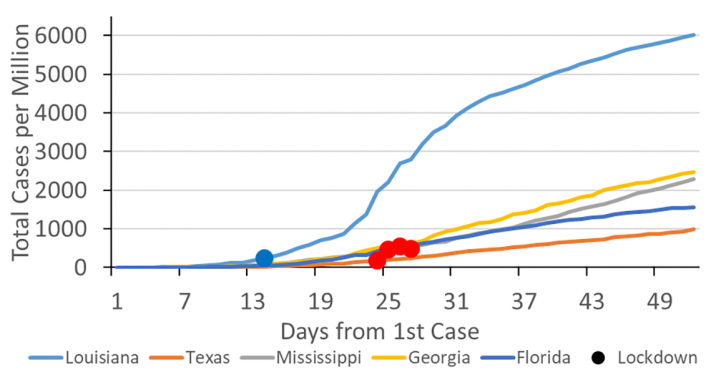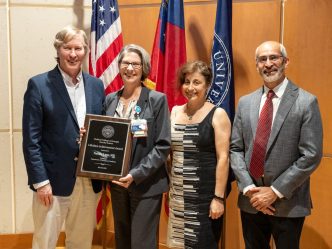Dr. Anthony Fauci, director of the National Institute of Allergy and Infectious Diseases, recently posed the question, “How many deaths and how much suffering are you willing to accept?” Politicians and leaders are currently struggling with a very difficult decision — balancing the immediate economic costs to businesses and workers with the medical and health benefits of a lockdown.
“As an aspiring physician, I was particularly interested in the public health consequences of states’ decisions to impose lockdowns at various times,” said Nitish Sood, a student at Augusta University. “Our study aims to answer Dr. Fauci’s question from a public health angle, examining the increase in cases in states that delayed lockdown orders.”
Nitish Sood, who is studying cellular and molecular biology and is expected to enroll in the Medical College of Georgia in the fall, conducted this research with Gerard Tellis, Neely professor at the USC Marshall School of Business, and Ashish Sood, associate professor at University of California, Riverside.

Nitish Sood said that given the complexity of the question and the numerous factors influencing these outcomes, it is impossible to run a clean quantitative analysis when many variables are still unobserved. Researchers also cannot use lab experiments as that introduces constraint and an artificial environment that does not account for the multiple influences at work.
An excellent solution in such dynamic circumstances is the use of natural experiments. Through natural experiments, researchers can compare the effect of policy differences between states that are similar on many factors like population, density, climate, housing and geography but differ on one key variable — policy decision on lockdown.
The researchers used this method of natural experiments to identify six cohorts of similar neighboring states with different lockdown dates. The comparison of these cohorts yielded the following results. On May 5, they found delaying lockdowns increased total cases by as much as 25%, while failing to lock down a state at all increased the number of positive cases of COVID-19 by as much as 128%.
This research is the most recent in the series of articles the trio has published this year. In April, they published two studies in the open source journal Social Science Research Network (SSRN). They first found that states should remain in lockdown for months to effectively reduce the spread of COVID-19.
The authors noted that the U.S. did not have a mandatory social distancing policy at the outset of the COVID-19 crisis. As a result, each of the 50 states responded at different times and with different policies, including lockdowns. In a follow-up study, they found that governors hesitated to lock down states for various reasons and were driven less by the severity of the pandemic in their state and more by economic and political reasons.
As the study was published, the growth rate of the disease was in decline in all states. The authors compared two neighboring states that are similar in all aspects except dates of lockdowns. They compared data from seven such pairings from different regions across the country.
“The major implication emerging from this analysis of seven natural experiments is that policy regarding response to pandemics should be informed by federal agencies and scientists with the resources to forecast pandemics, rather than be left solely to state governors or local officials who lack such resources,” Tellis said in a news release.
Read the study here.
 Augusta University
Augusta University




